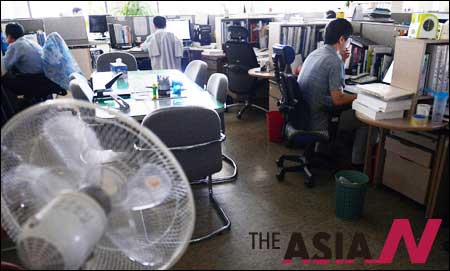Scorching purgatory

Air-conditioners and fluorescent lights are switched off at the offices of the Korea Power Exchange, where employees are pressed to set an example in the government’s energy-saving drive
Workers take refuge in malls, theaters; complaints grow over energy-saving drive
Koreans are withering under what could prove to be the hottest summer on record. But with government officials tightly controlling the use of air conditioners in public buildings and ruthlessly pushing its energy-saving campaign to private employers over growing fears of an electricity crisis, beating the heat is becoming a game of improvisation.
Many people are going to coffee shops more frequently and 24-hour convenience stores during working hours because their poorly-ventilated work spaces leave them hot and sticky. Others hop on to buses and subways for distances they would normally walk. And it’s commonplace to see pedestrians with handheld fans, sodas and cooled scarves draped around their necks.
A silver lining for workers is that the abnormally hot summer has been pushing out notoriously uptight dress codes that were a distinguishing feature of Korea Inc. Short pants and slippers are becoming acceptable in some companies, which would have been unthinkable not long ago. And with air-conditioners under draconian control, electric fans are in vogue once again.
But no matter how hard people try, it’s hard to avoid the cruel weather that has temperatures often matching that of the human body. One newspaper report Thursday reported that indoor temperatures at offices in downtown Seoul spiked over 30 degrees Celsius in average early this week and even 35 degrees in some areas.
“It’s like hell,’’ complained one office worker in Seoul. “I have never experienced anything like this. This is indeed an extreme environment.’’
He said his sleeves and trouser legs are always rolled up and he is kept busy refilling his bottle of ice water or soda hour after hour. Summers have always been hot and sweaty, but this is the first time that he has felt so exhausted and wonders whether he will have to eventually see a doctor.
In a recent survey of around 900 workers in Seoul by a job information website, more than 60 percent of the respondents say they have been experiencing dizziness, indigestion and other health problems under the hot weather.
Due to concerns over the health of employees, some companies are even introducing extra summer breaks. The Korea Center for Disease Control and Prevention said that 14 people died of heat stroke from last month, more than doubling the number of last year.
Government employees particularly have it worse as they wilt under a policy of air-conditioner prohibition. The cooling systems in the buildings are sporadically turned on only when indoor temperatures are “extremely’’ high, according to officials.
“It’s like a sauna, no less than that. I’m working in an unbearable environment,” said an official at the Prime Minister’s Office (PMO) in downtown Seoul. “Only when the temperature goes up too high, air conditioners are turned on for 15-20 minutes and then turned off.”
The official said she has no choice but to endure the extreme conditions.
“What I can do for now is pray that God will stop the heat wave,” she said. “With a strict dress code in place for public servants, I cannot commute wearing a casual summer dress.”
A PMO spokesperson said the restriction for the use of a cooling system in government buildings will be maintained until the government is certain that there is no risk of blackout.
The state weather agency forecasts that the abnormally hot summer heat will continue to grip the Korean Peninsula until early September.
A nationwide rainfall is expected this weekend, but this will not cool the ground significantly, according to the Korea Meteorological Administration. <The Korea Times/Park Si-soo>

























































